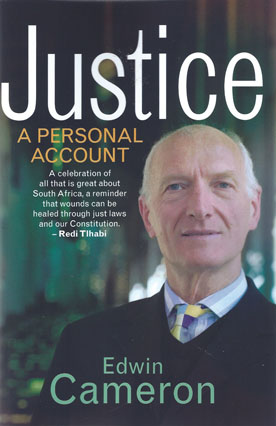
Edwin Cameron’s gripping and revealing new book is part memoir and part ode to the law. The book opens at the funeral of Cameron’s sister Laura when he was just seven. His father was accompanied by prison officials, having been briefly let out of prison for the occasion. This was the young Cameron’s first exposure to the law...
In Justice, Cameron explains and defends the role of the law in South Africa’s continuing transition. He draws on his own life experience – of poverty, of a youth spent in a children’s home, of his differentness and of stigma – to illustrate the power and the limitations of the law.
Cameron argues his case – that the Constitution offers South Africans our best chance for a just society – with personal passion, but also with the insights gained from hard years of judicial experience. Published in the run-on to the national election, Justice comes at a critical time in our country.
"The flow and integration are excellent. The ending is powerful and very meaningful. A really different and special and hopeful and great addition to our legal literature, and a courageous and constructive and encouraging autobiographical contribution. I am sure it will be received with enthusiasm and acclaim". – Justice Laurie Ackermann
"A remarkable integration of fascinating and often moving personal memoir, professional reminiscence and acute historical analysis of South African law, politics and society." – Sir Sydney Kentridge, QC
"[A]n enormously compelling work of advocacy for constitutional democracy, uniquely compelling, in fact, because nobody else could possibly have written it. The way Cameron uses his position and stature and personal history to tell a story about the public values that ought to constitute our common world is admirable and enormously creative. ... a powerful piece of propaganda in the debate about what it is that we have transitioned to; I hope it gets read very widely, widely enough to challenge the rival propagandas." – Johnny Steinberg
About the author -
Edwin Cameron has been a Justice of South Africa’s highest court, the Constitutional Court, since 1 January 2009.
Cameron was educated at Pretoria Boys’ High School, Stellenbosch and Oxford, where he was a Rhodes Scholar and won the top academic awards and prizes. During apartheid he was a human rights lawyer. President Mandela appointed him a judge in 1994. Before serving in the Constitutional Court, he was a Judge of the Supreme Court of Appeal for eight years, and a Judge of the High Court for six.
Cameron was an outspoken critic of then President Thabo Mbeki’s AIDS-denialist policies, and in 2005 wrote a prize-winning memoir, Witness to AIDS, about his own experience of living with AIDS. Published in South Africa, the United Kingdom, the United States and in translation in Germany and in China, Witness to AIDS was co-winner of the prestigious Sunday Times Alan Paton award.
Cameron chaired the governing council of the University of the Witwatersrand for more than ten years (1998-2008), and remains involved in charitable and public causes. He has received numerous honours for his legal and human rights work, including a special award by the Bar of England and Wales in 2002 for his ‘contribution to international jurisprudence and the protection of human rights’.
He is an honorary fellow of the Society for Advanced Legal Studies, London, and of Keble College, Oxford (2003), as well as an honorary bencher of the Middle Temple, London (2008). He holds honorary doctorates in law from King’s College London (2008), the University of the Witwatersrand, Johannesburg (2009), Oxford University (2011) and the University of St Andrews (2012).